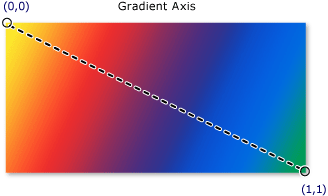LinearGradientBrush.EndPoint Property
Definition
Important
Some information relates to prerelease product that may be substantially modified before it’s released. Microsoft makes no warranties, express or implied, with respect to the information provided here.
Gets or sets the ending two-dimensional coordinates of the linear gradient.
public:
property System::Windows::Point EndPoint { System::Windows::Point get(); void set(System::Windows::Point value); };public System.Windows.Point EndPoint { get; set; }member this.EndPoint : System.Windows.Point with get, setPublic Property EndPoint As PointProperty Value
The ending two-dimensional coordinates of the linear gradient. The default is (1,1).
Remarks
A LinearGradientBrush paints a gradient along a line. The line's start and end points are defined by the StartPoint and EndPoint properties of the LinearGradientBrush.
The default linear gradient is diagonal. In the default, the StartPoint of a linear gradient is (0,0), the upper-left corner of the area being filled, and its EndPoint is (1,1), the lower-right corner of the area being filled. The colors in the resulting gradient are interpolated along the diagonal path.
The following image shows a diagonal gradient. The black line was added to highlight the interpolation path of the gradient from the start point to the end point.
 A diagonal linear gradient
A diagonal linear gradient
Specifying Relative or Absolute Values
Note that the MappingMode property of a LinearGradientBrush determines whether its EndPoint is interpreted as a relative or absolute value. A MappingMode of RelativeToBoundingBox specifies that the EndPoint value is relative to the size of the painted area. A MappingMode of Absolute specifies that the EndPoint value is expressed in device independent pixels. By default, the MappingMode is set to RelativeToBoundingBox, making the EndPoint a relative value.
Dependency Property Information
| Item | Value |
|---|---|
| Identifier field | EndPointProperty |
Metadata properties set to true |
None |
